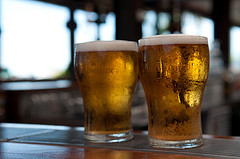
Alcohol is widely used in social interactions but it can cause health, social, and safety problems when not used responsibly. One in four Australians drink at risky levels. People in farming communities are more likely to binge drink (consume alcohol at short-term risky levels) when compared with the general Australian population.
Farmers must take special care not to be under the influence of alcohol while using (or supervising others using) farm equipment, tractors, bikes, and other vehicles; handling animals; or supervising children. Alcohol affects your attention, concentration, coordination and judgement–putting you and others at greater risk of injury or death. The short-term harmful effects of alcohol can be increased when taken with illicit drugs, and prescribed or over-the-counter medications.
Misusing alcohol causes harm to people other than the drinker. Alcohol contributes to violence and family conflict. Alcohol is involved in 23-63% of all family violence reported to the police. Alcohol is associated with an increased risk of violence occurring and an increase in the level of harm that results from this violence.
The less you drink, the lower your risk of harm from alcohol-related disease and injury. Current government guidelines recommend limiting your alcohol to no more than four standard drinks on any one day and no more than 10 standard drinks per week. Drinking at risky levels can cause serious short and long-term health effects. 10-15% of all presentations to hospital emergency departments are alcohol-related. One in four road deaths are the result of drink driving. If you are pregnant or under 18 years of age, it is recommended that you do not drink alcohol at all.
Drinking alcohol increases the risk of a range of cancers including liver, breast, colorectal, pancreatic, mouth, oesophageal and throat. Risk increases as more alcohol is consumed. Alcohol can also reduce the function of the immune system, and cause or exacerbate sleep problems and sexual dysfunction. There is no clear evidence that drinking a small amount of alcohol protects against heart disease or type 2 diabetes.
During the COVID-19 pandemic, alcohol use increased in rural areas. This was particularly notable for people experiencing higher stress and anxiety, those having to manage childcare challenges, and people whose employment was under threat.
Rural issues – alcohol and mental health
Alcohol plays a role in both the development and progression of poor mental health and suicide. Drinking can increase the chances of developing a mental health condition in at-risk people (e.g. people prone to depression or anxiety). Self-medication with alcohol is a common, but unsafe and ineffective coping strategy for farmers and other people living in rural and remote areas. Alcohol only masks the symptoms of depression and stress, and can make you feel worse. Alcohol misuse is also a risk factor for suicide. Support services can assist rural people to find other ways to tackle tough times.
Find out more about this topic on Better Health Channel
Fast facts:
- Alcohol, when not used responsibly, can damage your health and contribute to violence and risk of injury or death
- Food may slow down absorption of alcohol, but it will still hit your bloodstream and affect your judgement.
- Don’t use beer to quench your thirst while working; it will increase your risk of accidents. Drink water or non-alcoholic drinks instead.
References used for this topic page
More information:
Australian Department of Health
National Alcohol Strategy 2019–2028
National Health and Medical Research Council
Australian Guidelines to Reduce Health Risks from Drinking Alcohol
VicHealth
Reducing alcohol-related harm in the workplace
Australian Government Department of Health
Alcohol during pregnancy and breastfeeding
Australia’s National Research Organisation for Women’s Safety
Links between alcohol consumption and domestic and sexual violence against women: Key findings and future directions
Foundation for Alcohol Research and Education
Alcohol use and harms during the COVID-19 pandemic
ABC Conversations Podcast
Shanna Whan’s best sober life
Day Break – An app to help you change your relationship with alcohol
Desktop version: https://www.hellosundaymorning.org/daybreak/
Apple: http://bit.ly/AppleDayBreakApp
Android: http://bit.ly/AndroidDayBreakApp
Clinical care:
The Medical Journal of Australia
New Australian guidelines for the treatment of alcohol problems: an overview of recommendations
Western Australian Mental Health Commission
Counselling Guidelines: Alcohol and other drug issues
Research & reviews:
NHMRC Clinical Trials Centre
Evidence Evaluation Report: Evaluating the evidence on the health effects of alcohol consumption
The Journal of Rural Health
Alcohol Consumption, Obesity, and Psychological Distress in Farming Communities—An Australian Study
Australian and New Zealand Journal of Public Health
Identifying individual- and population-level characteristics that influence rates of risky alcohol consumption in regional communities
|
|